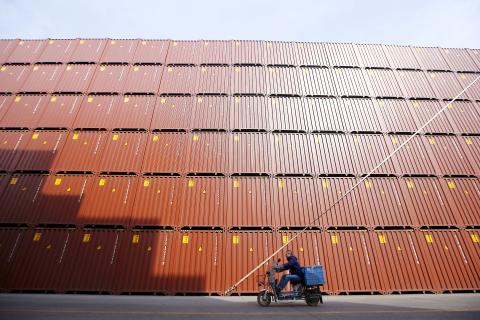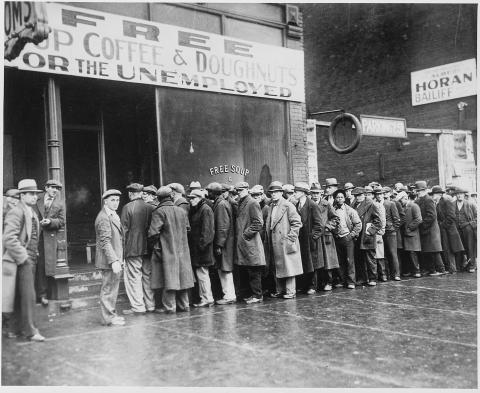US President Donald Trump on Friday announced the US will impose a comprehensive set of trade tariffs on Chinese imports — estimated to amount to at least US$50billion — following an investigation by US government agency, Office of the United States Trade Representative (USTR) into intellectual property theft by China.
In addition to the imposition of 25 percent duties on targeted Chinese products, Trump also instructed US Treasury Secretary Steven Mnuchin to impose new investment restrictions to prevent Chinese companies from acquiring strategically important US technologies.
The investigation, which commenced in August last year, found China uses joint venture conditions, foreign investment restrictions, and administrative review and licensing processes to force or pressure technology transfers from American companies.

Photo: Reuters
照片:路透
The USTR also found that China directs and facilitates investments and acquisitions which generate large-scale technology transfers and conducts and supports cyber intrusions into US computer networks to gain access to valuable business information.
Prior to the announcement, Wei Jianguo, executive deputy director of a Beijing think tank, China Center for International Economic Exchanges, used robust language: “If Trump really signs the order, it is a declaration of trade war with China.” Wei continued: “China is not afraid, nor will it dodge a trade war. We have plenty of measures with which to fight back, in areas of automobile imports, soybean, aircraft and chips. Trump should know this is a very bad idea, and there will be no winner, and that there will be no good outcome for either nation.”
Following the imposition of the tariffs, China unveiled reciprocal tariffs on approximately US$3billion of US imports ranging from pork, recycled aluminum, steel pipes, fruit and wine.

Photo courtesy of United States Information Agency /Wikimedia Commons
照片:美國新聞署/維基共享資源
“The US declared a trade war, but China is acting quite restrained. The list that China has announced appears to be a retaliation, but still it is very measured,” said Li Yong, senior fellow of China Association of International Trade, quoted by Bloomberg. “The move sends a message that China is able to fight back, but we still want a trade peace instead of a trade war,” said Li.
(Edward Jones, Taipei Times)
美國總統川普週五宣布,美國將對中國進口商品課徵全面性關稅,預估金額將超過五百億美元。這項決定奠基於美國政府機構──美國貿易代表署──日前針對中國從美國竊取智慧財產所展開的調查。
除了對特定中國產品課徵百分之二十五的關稅之外,川普同時指示美國財政部長梅努欽制定新的投資限制,以防制中國公司收購美國具戰略重要性的科技。
美國貿易代表署從去年八月開始進行調查,發現中國利用合資企業條件、外國投資限制等方式,並且藉由行政審核與授權程序等手段,強迫或是向美國公司施壓,要求對方進行技術轉移。
美國貿易代表署同時發現,中國透過主導和促使國內公司進行投資與併購,進而產生大規模的技術轉移,並主導和支援發動網路攻擊行動,入侵美國的電腦網路系統,以獲取珍貴的商業資訊。
在川普宣布這項決議之前,北京智庫中國國際經濟交流中心副理事長魏建國強硬地表態:「川普若真簽署命令,等同宣告中美貿易戰開打。」魏建國進一步表示:「中國不會害怕,也不會迴避貿易戰爭。在汽車進口、大豆、飛機和晶片等方面,我們有許多反制措施。此外,川普應該曉得這是非常糟糕的想法,也不會有贏家,對兩國來說都是有害而無益。」
在美國宣布課徵關稅後,中國緊接著揭露報復性的關稅措施,預估將對美國進口商品──範圍從豬肉、回收鋁製品、鋼管、乃至於水果與酒類──課徵大約三十億美元的關稅。
據彭博社報導,中國國際貿易學會的資深研究員李永指出:「美國此舉宣示貿易戰開打,但中國的行動非常節制。中國公布課徵關稅的貨物清單,看起來像是報復,其實仍是斟酌後的結果」。李永表示:「這個舉動是為了要傳達一個訊息,那就是中國仍有能力反擊,但我們要的並不是貿易戰爭,而是一個平和的貿易環境。」
(台北時報章厚明譯)
Follow up
讀後練習
Reading Comprehension
The current US-China trade war is not the first time protectionist trade measures have been adopted by the US — but will it work and how could it affect the global economy?
Perhaps the most famous example of a trade war is the series of reciprocal protectionist trade policies which were adopted by many countries during the Great Depression of the 1930s. Following the Wall Street Crash of 1929, the US Senate passed the Tariff Act of 1930, commonly known as the Smoot–Hawley Tariff, which raised tariffs on over 20,000 imported goods. Other countries soon retaliated with boycotts of US goods and reciprocal tariffs against US products.
Although the tariff initially appeared to be a success, between 1929 to 1933 US exports decreased 61 percent from US$5.4billion to US$2.1billion and unemployment in the US jumped from 8 percent in 1930 to 16 percent in 1931, and reached 25 percent by 1933.
Meanwhile, US tariffs forced Canada, France and Britain to forge closer economic links which each other and develop new trading partners, while Germany pursued a system of autarky (economic self-sufficiency), resulting in an overall reduction in global trade.
However, economists disagree to what extent protectionism was responsible for worsening the Great Depression. US economist Paul Krugman has argued that the Tariff Act exacerbated the Great Depression by preventing a recovery in trade after production had recovered. However, another US economist, Milton Friedman, attributed the Great Depression to severe monetary contraction caused by a banking crisis and poor policy making by the Federal Reserve.
Questions
1. Why did US President Donald Trump decide to impose tariffs on Chinese goods? Was he justified in doing so?
2. Do you think it is possible that the US-China trade war could escalate out of control and cause a new Great Depression?
3. If you were the US president, would you have handled the situation any differently? If so, how?
(Edward Jones, Taipei Times)

In an effort to fight phone scams, British mobile phone company O2 has introduced Daisy, an AI designed to engage phone con artists in time-wasting conversations. Daisy is portrayed as a kindly British granny, exploiting scammers’ tendency to target the elderly. Her voice, based on a real grandmother’s for authenticity, adds to her credibility in the role. “O2” has distributed several dedicated phone numbers online to direct scammers to Daisy instead of actual customers. When Daisy receives a call, she translates the scammers’ spoken words into text and then responds to them accordingly through a text-to-speech system. Remarkably, Daisy

Bilingual Story is a fictionalized account. 雙語故事部分內容純屬虛構。 Emma had reviewed 41 resumes that morning. While the ATS screened out 288 unqualified, she screened for AI slop. She could spot it a mile away. She muttered AI buzzwords like curses under her breath. “Team player.” “Results-driven.” “Stakeholder alignment.” “Leveraging core competencies.” Each resume reeked of AI modeling: a cemetery of cliches, tombstones of personality. AI wasn’t just changing hiring. It was draining the humanity from it. Then she found it: a plain PDF cover letter. No template. No design flourishes. The first line read: “I once tried to automate my

Every May 1, Hawaii comes alive with Lei Day, a festival celebrating the rich culture and spirit of the islands. Initiated in 1927 by the poet Don Blanding, Lei Day began as a tribute to the Hawaiian custom of making and wearing leis. The idea was quickly adopted and officially recognized as a holiday in 1929, and leis have since become a symbol of local pride and cultural preservation. In Hawaiian culture, leis are more than decorative garlands made from flowers, shells or feathers. For Hawaiians, giving a lei is as natural as saying “aloha.” It shows love and

1. 他走出門,左右看一下,就過了馬路。 ˇ He walked outside, looked left and right, and crossed the road. χ He walked outside and looked left and right, crossed the road. 註︰並列連接詞 and 在這句中連接三個述語。一般的結構是 x, y, and z。x and y and z 是加強語氣的結構,x and y, z 則不可以。 2. 他們知道自己的弱點以及如何趕上其他競爭者。 ˇ They saw where their weak points lay and how they could catch up with the other competitors. χ They saw where their weak points lay and how to catch up with the other competitors. 註:and 一般連接同等成分,結構相等的單詞、片語或子句。誤句中 and 的前面是子句,後面是不定詞片語,不能用 and 連接,必須把不定詞片語改為子句,and 前後的結構才相等。 3. 她坐上計程車,直接到機場。 ˇ She took a cab, which took her straight to the airport. ˇ She took a cab and it took her straight